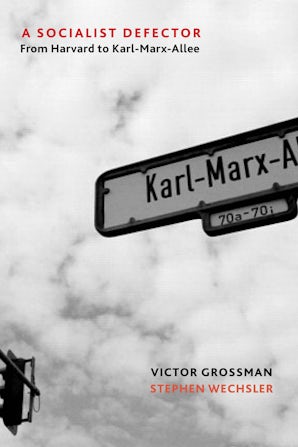“A Socialist Defector” (Grossman reviewed in Socialism and Democracy)

A Socialist Defector:
From Harvard to Karl-Marx-Allee
By Victor Grossman
352 pages / $23 / 978-1-58367-738-4
Reviewed by Renate Bridenthal for Socialism and Democracy
Victor Grossman, born Stephen Wechsler in 1928 in New York City, has written his second book about his defection to East Germany in 1952. The first, Crossing the River, described his escape from the US Army to the German Democratic Republic (GDR), for fear of charges of perjury (having denied his membership in the US Communist Party) and his initiation to life as a journalist in his new home. A Socialist Defector not only continues his personal story, but also offers a unique insider’s view of real life in the GDR. It is a bittersweet, clear-eyed, but no-regrets memoir of his 38 years in the small socialist state and the years after unification with West Germany. Not uncritical in his retrospective of its evolution, hemmed in as it was by the great power politics of the Cold War, Grossman nevertheless retains his principles and ideals and respect for the degree to which the GDR was able to attain them. Humor leavens the nostalgia of his best memories.
In the US, the GDR has mainly been presented in literature and film as a repressed, haunted society. This book is an eye-opening response. Trained in the GDR as a journalist, Grossman was certainly aware of censorship. Although little subjected to it directly, since he mainly wrote and lectured about American culture, especially its folkways and folksongs, he heard citizens’ complaints and cabaret satire. Culture was seen as a weapon of revolution, but such limitation alie- nated writers and muffled creativity. However, Grossman recognizes that art was weaponized in the West as well, where Hollywood writers and actors were blacklisted and where CIA fronts like the “Com- mittees for Cultural Freedom” subsidized newspapers, tours, and art exhibits. In Germany, television broadcast seductive American culture and alluring advertisements while the CIA-funded Radio in the American Sector (RIAS) urged what today is called “regime change.”
Grossman makes clear that nothing about the GDR can be understood without taking into account the Cold War. Conscious of Germany’s recent history of fascism and of Western attempts to smother the GDR in its cradle with the political use of ex-Nazis, he understands the STASI to have been a largely defensive operation. Although he acknowledges that it became corrupted over time, he notes that later research has shown that the number of its informers has been greatly exaggerated.
But the influence of the Soviet Union was undeniable. While deploring “shameful” aspects of Stalin’s rule and its “heavy hand” that limited economic experimentation, Grossman finds the Soviet presence to have been crucial in erasing fascism from public life, “breaking the chokehold of cartels, banks, chauvinist press lords and arrogant Junkers.” In a separate section, titled “The USSR and Me,” he reminds us of the historical context for his continuing hope that the Soviet experiment would ultimately succeed. He mentions support of the Spanish republic during its civil war, the Soviet attempt to build an anti-fascist alliance before Western appeasement of Hitler, and the tremendous Russian losses in World War II. There were the Soviet achievements in bringing literacy, education, healthcare, and culture to what had been a largely backward Russian society. Back home in the US, the Communist Party fought racism and sup- ported worker organizing. His own part in it as a young Harvard student was recorded in 1,100 pages of a FOIA file (speaking of surveillance)….
You can access this review at Taylor and Francis


